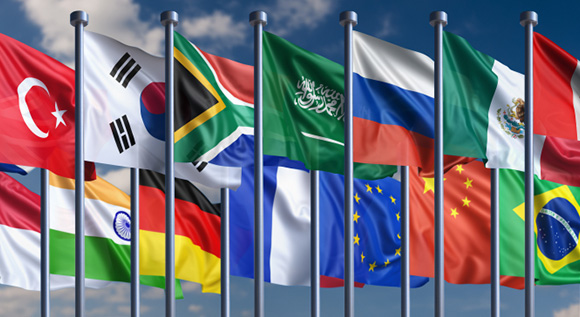German G20 presidency: spotlight on energy systems
For one year, Germany will head up the central forum of the 20 leading industrial and emerging economies on financial and economic issues. The Federal Government especially wants to use this time to further advance the transformation of global energy systems.
 © iStock.com/sitox
© iStock.com/sitox
At the end of 2015, 195 countries came together to attend the COP 21 climate conference in Paris. They used the event to reach a special agreement: by the end of this century, greenhouse gas emissions are to have been reduced so significantly that the rise in global temperature stays below 2 degrees, and ideally does not rise more than 1.5 degrees. This agreement has already entered into force. Now it is up to the German G20 presidency to drive forward the work necessary towards realising this agreement. During this time, its focus here is to ensure that the group of the 20 most important industrialised countries and emerging economies – the G20 countries – serve as leaders in implementing the Paris climate agreement. A further aim is thus to bring energy interests closer together with climate protection. The German G20 presidency will focus on the scope in energy policy and the economic potential that can be tapped by addressing the significant need for investment in the energy sector and beyond.
What investments are necessary in order to ensure that the transformation of global energy systems takes place in accordance with the targets set in the Paris climate agreement and is also an economic success? What political framework needs to be put in place in order to mobilise this investment? What solutions are already available in the various sectors today, and which technologies are in need of the greatest investment? These are just some of the questions that will be at the heart of the work of the G20 over the coming months. In addition to this, the G20 will also seek to identify and agree on common areas of focus in energy and climate policy and decide on activities that will enable the process of transforming the energy systems in the long-term to be realised.
The German presidency’s energy roadmap
An important facet of the global energy transition is the paradigm shift in energy investments, which often run long-term. This involves shifting the focus away from fossil technologies, towards greater efficiency and renewable energy.
“The challenge for the leading nations around the world is to make the energy supply virtually climate-neutral by the middle of the century”, says Rainer Baake, State Secretary at the Federal Ministry for Economic Affairs and Energy. “At the same time, it is also crucial for our economies that our energy supply is secure and affordable. The G20 are united around this challenge – despite all of our differences, not only the differences in our energy systems – and this is what makes discussion and dialogue on energy and climate policy so important.”
The countries of the G20 will come together several times over the next few months in order to discuss these issues. The Berlin Energy Transition Dialogue, which will take place from 20-21 March 2017, is just one of the meetings providing opportunity for discussion at international level. The highlight of the German G20 presidency will be the G20 summit attended by heads of state and government. This meeting will take place in Hamburg from 7-8 July.
Just under 70 per cent of global greenhouse gas emissions
The G20 is a political and economic heavyweight. The G20 countries represent approximately two thirds of the world’s population, more than four fifths of the world’s GDP and three quarters of world trade, and play a key role in mitigating climate change. Together, these countries emit just under 70 per cent of global greenhouse gas emissions.

